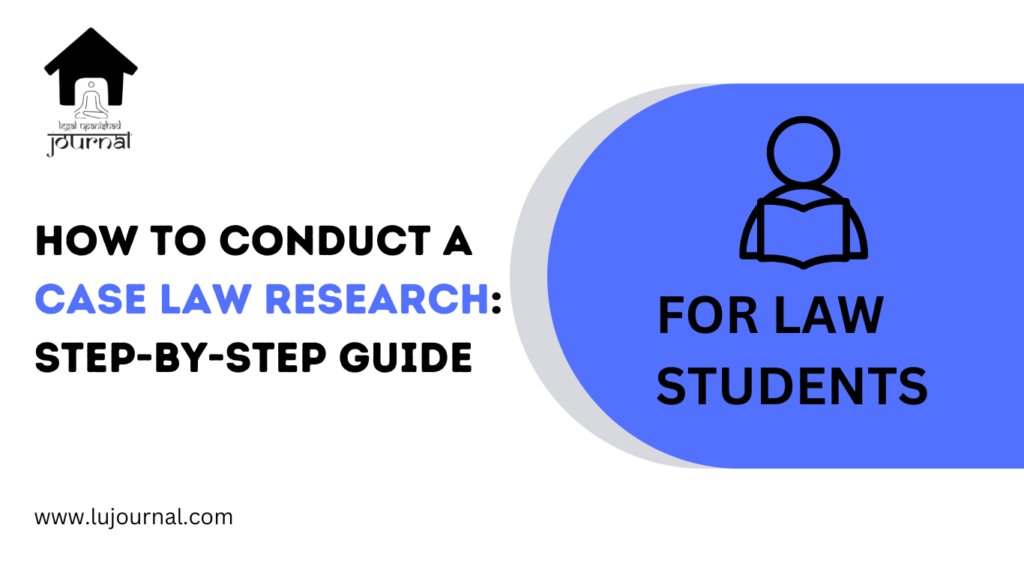This article on ‘How to Conduct a Case Law Research: Step-by-Step Guide‘ is a guide for law students.
Have confidence in your work and submit now – your ideas deserve to be read! Do Check the Submission Guidelines before submitting.
Table of Contents
Introduction
When it comes to the practice of law or lawyers in general, the most common image that pops into our minds is of them arguing in court, defending their clients by interpreting the law in their favour. We often forget the fact that such arguments require a thorough amount of research on various laws, precedents, legislations, etc.
Legal research is not only an essential skill for a lawyer who has years of experience but also for a law student starting his/her career. This is why it is important to know the basics of Legal research thoroughly. Case Laws are an important component of legal research, they provide an insight on how courts have interpreted the law in specific cases.
This article will provide a step-by-step guide on conducting thorough case law research to make your research paper and arguments solid.
What is Law Research?
Law research involves the process of searching and gathering various relevant legal information that applies to a particular legal question or issue. It involves analyzing various sources of law such as statutes, precedents, regulations, case laws, court opinions, etc.
The purpose of legal research is to provide analysis and understanding of a specific issue. It is needed to establish a solid foundation for legal action. This skill helps lawyers, law students, and other legal professionals back up an argument in the court of law, to provide case briefs in class, and give a piece of strong legal advice to clients. This is done using a variety of tools such as legal databases, libraries, online resources, and others to locate and review primary and secondary sources of law.
Step-by-Step Guide to Conducting Thorough Case Law Research
Following are the steps one should follow while conducting case law research:
Step 1: Understand the Facts of the Case.
The first and foremost thing one should analyze is the facts of the case. It is crucial to gather the facts of the case, know the ‘who’, ‘what’, ‘why, ‘when’, and ‘how’ of your case. Write down everything that has taken place in the case and everything that is going on presently. It is important to write down facts that are not so relevant as well. Sometimes these facts may seem unimportant, but they can make a big difference in the case. Check and revise it often to make sure it is accurate.
One should make sure to include the dates of incidents as well and use those dates to make a case timeline. This will help you be aware of the important dates in the case and provide a helping hand in your legal research process. Facts also help you in identifying your legal issues.
Step 2: Determine your Legal Issue.
The second step helps one get an idea of the legal issue they are facing. It often can be difficult to figure out where to start your case law research, identifying the issue will provide a guide on what type of law should be researched. For example, if one has committed the offense of murder, the laws applied would come under Criminal Law. We all know Criminal Law is very broad in nature, hence narrowing down the problem will help in finding the sections related to the offenses much easier.
What will be the remedy for the case?
As we stated the importance of identifying the legal issue of the case, is also important that what remedy should we seek from the court of law. Taking the example of murder as mentioned earlier, if our client has been accused of murder, we must prove that he is innocent. If a person has falsely accused our client, then it would be necessary to seek relief for such cause. It is also important to note at what stage are we seeking remedy, has our client already been sentenced? or whether the trial is still going on. These are important considerations at the initial stages of legal research.
What jurisdiction will it fall under?
Jurisdiction plays a main role in finding solutions to the issues if we are filing a case at the wrong
court, no matter how good a person is at arguments, time will be wasted. In the aforementioned
example, if the accused and the victim both reside in Mumbai and the crime has taken place in the
the same city, it is necessary to file a case in the High Court of Mumbai and not Delhi, as Mumbai has
geographical jurisdiction.
Step 3: Use of Case Laws.
The next step of this process is to know the law that would support your legal arguments. There are two types of sources of laws you could use to make your arguments and research more robust.
- Primary Sources
- Secondary Sources
Primary Sources:
Primary Sources of law are key to legal research. These sources are the foundations of law and provide a clear view and understanding of the current laws. Sources such as Constitution, Statutes, Legislations, Treaties, Regulations, and Case Laws are said to be Primary Sources of Law.
Secondary Sources:
Secondary Sources of Law are those that explain or interpret laws in detail. They summarize and give a better understanding of particular laws in great detail. These sources include, Law review articles, journals, guides, etc. Secondary sources save a lot of time for the researcher, if the source is reputable, the writer of the said source must have analyzed and reviewed all primary sources as they go through the process of legal research too. You can take advantage of the citations in law journals and articles.
Check that the law you’re using is a ‘good law’- it is essential to verify whether the cases and precedents one might come across are good and valid, using an unconstitutional or overruled case law might be more harmful than helpful.
Conclusion
Overall, law case law research is a critical skill that needs to be instilled in every legal professional to stay informed and make a well-rounded legal decision. To summarize, one needs to gather facts about the case and make sure to identify the issues about the case. One should be patient and careful and by using case laws as support, arguments in court will be solid and help you win your case.
References
- Sharon Miki, “A Step-by-Step Guide on How to Do Legal Research”, Clio, available at: https://www.clio.com/blog/how-to-do-legal-research/ (last visited on 20 July 2023)
- “Legal Research: Steps to Follow”, Texas Law Help, available at: https://texaslawhelp.org/article/legal-research-steps-to-follow (last visited on 20 July 2023)
- “How to do legal research in 3 steps”, Thomson Reuters, 10 November 2020, available at: https://legal.thomsonreuters.com/en/insights/articles/basics-of-legal-research-steps-to-follow (last visited on 20 July 2023)




